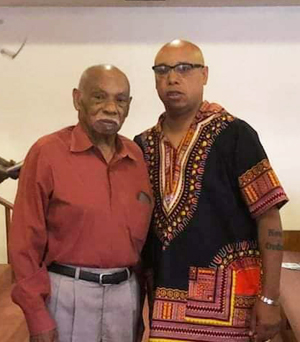
By Rev. Donald L. Perryman, Ph.D.
The Truth Contributor
What I miss is the enduring commitment of leaders like Reverend Rose, who not only stood up for what’s right but also persevered long enough to inspire action and effect change, continuing their fight until meaningful progress was achieved or the battle was won.
– Doris Greer
When I received a call from Carty Finkbeiner, I braced myself, unsure what to expect. You don’t always know from what angle the sometimes-volatile former mayor might come at you. However, the news he shared filled me with an overwhelming sense of joy.
Finkbeiner had successfully orchestrated, on my behalf, the return of Rev. Floyd Rose to Toledo on January 8, 2024, to be honored at the United Pastors for Social Empowerments’ (UPSE) Social Justice Impact Awards banquet.
Rose, whose health has been declining and who seldom travels these days, still receives calls from Toledo seeking guidance on social justice and civil rights issues. It’s remarkable, considering it’s been nearly three decades since he left Toledo for Valdosta, Georgia. Unfortunately, an entire generation in Toledo has grown up unaware of the legacy of this civil rights icon, a testament to his enduring influence.
Yet, Rose’s portfolio of social justice outcomes is stunning.

During his time as president of the Toledo NAACP, Rev. Rose took a stand that dramatically shifted the city’s political landscape. He daringly organized a mini-convention within the NAACP, leading to a straw poll that showed significant support for the then-Republican mayoral candidate, Donna Owens. This bold move was in response to the city leadership’s failure to consider qualified Black applicants for top municipal roles. Owens’ subsequent election as mayor, with 47 percent of the Black vote, was a feat no other Republican has since come close to achieving. This historic moment was solely attributed to Rose’s influence.
Rev. Rose’s impact also extended beyond politics into advocating for economic equity. He launched the Fair Share Economic Initiative, mandating businesses with a significant Black customer base to provide equitable employment and contracting opportunities. This initiative was not just a policy but a statement against economic disparity and a step toward rectifying long-standing inequities.
His activism was characterized by bold and effective tactics seldom, if ever, utilized currently in Toledo. For instance, when the Lion Store, a key downtown retailer, balked at aligning with his Fair Share Economic Initiative, Rev. Rose showed up with busloads of African Americans and the media. When Black customers began cutting up their Lion Store credit cards in front of TV cameras, the move prompted the store to hire more Black employees and contract with an African-American Public Relations firm.
Another notable example was his response to the exclusion of Black workers in construction projects. Rose strategically used dump trucks to blockade a major job site at the University of Toledo. This drastic action not only halted the project but also brought critical attention to the issue, leading to agreements worth $50 million in wages and contracts for minority construction workers.
Doris Greer, a longtime community activist, recalls how Rev. Rose’s activism transcended individual glory and also embodied compassion and a deep connection to the struggles of the marginalized. “He was a man who fought for the rights and dignity of the oppressed, irrespective of gender or background. His concern even for the migrant workers, especially the women who faced unimaginable challenges in such deplorable working conditions, was a testament to his vision of social justice,” she says.
Greer’s portrayal of Rev. Rose highlights his commitment to justice and equity, even as his physical ability to lead from the front lines diminished. In her memories, Rev. Rose is a towering figure, embodying the relentless fight for a more humane and just world.
Finally, reflecting on Rev. Floyd Rose’s legacy raises essential questions for current Black leaders in Toledo.
What strategies and qualities are necessary to regain credibility and control over community issues?
The answer lies partly in embracing the tactics of Rev. Rose, who understood the power of direct action and community mobilization. He believed in bringing social justice issues to the forefront, making them visible, and then applying pressure.
Yet, since Rev. Rose’s return to Georgia in 1995, our community has struggled with a dependence on a political party that often overlooks or altogether ignores the policy interests of the African-American community and distances itself from its most loyal supporters. This dependence has hindered our ability to advocate effectively for our needs.
Rev. Rose, a disciple of Dr. Martin Luther King Jr.’s methods of protest and direct action, often faced criticism for being a “publicity-seeker.”
But as he explained 12 years ago, “My aim has never been about seeking confrontation, nor is it about shying away from it. The essence of resolving issues lies in dialogue. But first, we must capture the attention of those setting the agenda. This is the crux of the matter. Ensuring our issues are on the agenda is paramount. Confrontation or direct action is simply a tool to achieve that end.”
Contact Rev. Donald Perryman, PhD, at drdlperryman@enterofhopebaptist.org
